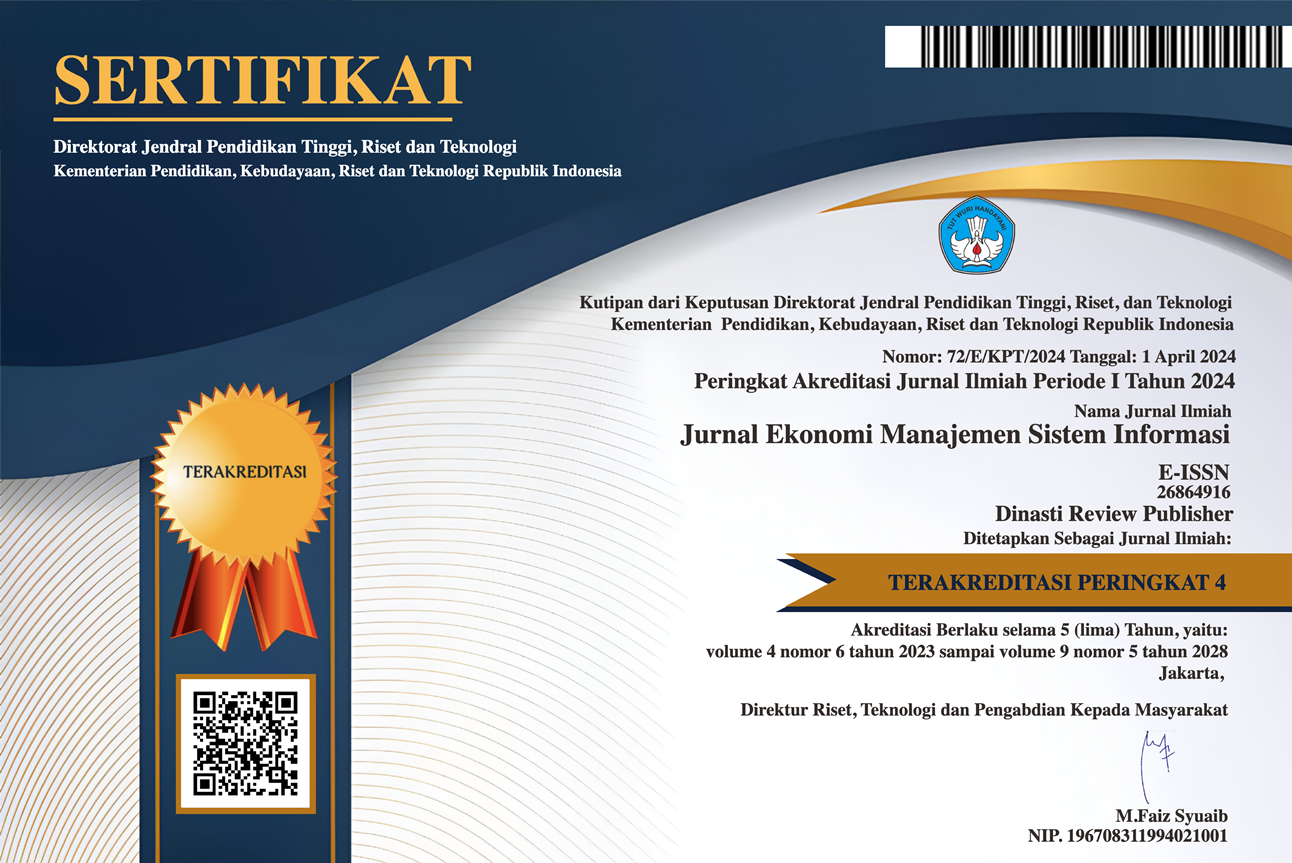Pengaruh Green Ability, Green Motivation, Green Opportunity terhadap Organizational Performance Dengan Green Innovation Sebagai Variabel Intervening Pada Industri Percetakan dan Reproduksi Media Rekaman
DOI:
https://doi.org/10.38035/jemsi.v6i6.5425Keywords:
Green Ability, Green Motivation, Green Opportunity, Organizational Performance, Green InnovationAbstract
This study aimed to analyze the influence of green ability, green motivation, and green opportunity on organizational performance through green innovation in the printing and reproduction industry of recorded media in Indonesia. The sampling technique in this study used the simple random sampling method with total of 114 employees as respondents. Primary data in this study were collected using questionnaire distributed via Google Form, which had been tested for validity and reliability. Data analysis in this study used outer model test consisting of convergent validity test and reliability test, and inner model test consisting of an R Square test and hypothesis test using SmartPLS version 4.0.9.9. The results showed that green ability, green motivation, green opportunity had positive and significant effect on organizational performance, green ability, green motivation, green opportunity had positive and significant effect on green innovation, green innovation had positive and significant effect on organizational performance, and green innovation had partial mediating effect on the relationship between green ability, green motivation, green opportunity and organizational performance. Further research could deepen the analysis of other factors that influenced organizational performance.
References
Admin. (2024). Dunia Percetakan dan Lingkungan: Menuju Keberlanjutan. Just Another Astra Starter Templates Site. https://gitaprint.com/dunia-percetakan-dan-lingkungan-menuju-keberlanjutan/
Ahmed, R. R., Akbar, W., Aijaz, M., Channar, Z. A., Ahmed, F., & Parmar, V. (2023). The role of green innovation on environmental and organizational performance: Moderation of human resource practices and management commitment. Heliyon, 9(1), e12679. https://doi.org/10.1016/j.heliyon.2022.e12679
Ali, I., & Taswiyah. (2022). Green Human Resource Management Dalam Dunia Industri(Kajian Empiris Dan Teoritis Dalam Implementasi Green Hrm). Jurnal Inovasi Penelitian, 3(6), 6799–6806.
Antika, R., & Suryani, T. (2024). Pengaruh Manajemen Sumber Daya Manusia Ramah Lingkungan Terhadap Perilaku Green Service Dengan Tanggung Jawab Sosial Perusahaan Sebagai Pemediasi. Jurnal Manajemen Strategi Dan Aplikasi Bisnis, 7(1), 121–136. https://doi.org/10.36407/jmsab.v7i1.1188
Azhar, M. (2023). Dekarbonisasi Menuju Indonesia Net Zero Emission 2060, Apakah Sudah Sesuai Jalur? Govinsider. https://govinsider.asia/indo-en/article/dekarbonisasi-menuju-indonesia-net-zero-emission-2060-apakah-sudah-sesuai-jalur
BPS Indonesia, S. I. (2023). Statistik Indonesia. Statistik Indonesia 2023, 1101001, 790. https://www.bps.go.id/publication/2020/04/29/e9011b3155d45d70823c141f/statistik-indonesia-2020.html
Chowdhury, S. R., Mendy, J., & Rahman, M. (2023). A Systematic Literature Review of GHRM: Organizational Sustainable Performance Reimagined Using a New Holistic Framework. Sustainability (Switzerland), 15(9). https://doi.org/10.3390/su15097513
Eucharistia, H., & Sistya Rachmawati. (2023). Pengaruh Keunggulan Kompetitif Hijau, Inovasi Hijau, Terhadap Kinerja Perusahaan Dengan Budaya Organisasi Hijau Sebagai Variabel Moderating. Jurnal Ekonomi Trisakti, 3(2), 2785–2794. https://doi.org/10.25105/jet.v3i2.16983
Huy, L. Van, Phan, Q. P. T., Phan, H. L., Pham, N. T., & Nguyen, N. (2022). Improving tourists’ green electronic word-of-mouth: a mediation and moderation analysis. Asia Pacific Journal of Tourism Research, 27(5), 547–561. https://doi.org/10.1080/10941665.2022.2091942
Imran, M., Arshad, I., & Ismail, F. (2021). Green Organizational Culture and Organizational Performance: the Mediating Role of Green Innovation and Environmental Performance. Jurnal Pendidikan IPA Indonesia, 10(4), 515–530. https://doi.org/10.15294/jpii.v10i4.32386
Insani, J. D. C., & Rizky, G. (2024). Pengaruh Green Human Resource Management Terhadap Green Competitive Advantage Dengan Organizational Citizenship Behavior for Environment Sebagai Variabel Intervening. EKOMA?: Jurnal Ekonomi, Manajemen, Akuntansi, 3(6), 1932–1950. https://doi.org/10.56799/ekoma.v3i6.4987
Irawati, A., & Rizky, G. (2024). The Influence of Green Human Resource Management on Competitive Advantage?: The Role of Green Innovation factory laborers , which has led to the growth of manufacturing industries and the. 9(2).
Irfanda, N. M., Handono, P., & Syafia, H. (2024). Statistik Lingkungan Hidup Indonesia 2024 (Krismawati (ed.); Vol. 43). BPS-Statistic Indonesia. https://web-api.bps.go.id/download.php?f=J4/O5wZtm3OkrwE4PIQasFNJcUt1bEt6NG5BV0RDRXVJelUwWW5NcVY1N0xZdmlLdTcyMlJZVGE3ZFA5SnYwcEQ5S0lBalhDbEpQakxCSDBPb2lqdnR3NGNQRHZncUJqb09qaXJXbDNlRUFRaVJLcXRjbWZGWHYwc2RCdEZqZUtHTHpRV3l2OWh5MkRlK3JsUmhGVnV4YTZRTUMzNEZiV0
Ismiyarto. (2017). Penilaian Kinerja Unit Pelayanan Pada Organisasi Publik. Jurnal Ilmu Pemerintahan Suara Khatulistiwa, 2(2), 12–29. https://doi.org/10.33701/jipsk.v2i2.923
Juliandi, A. (2018). Pelatihan SEM-PLS Program Pascasarjana Universitas Batam (hal. Structural equation model based partial least square (SEM_PLS): Menggunakan Smart PLS). hal.91. https://doi.org/10.5281/zenodo.2532119
Kementerian Energi dan Sumber Daya Mineral. (2019). Inventarisasi Emisi GRK Sektor Energi. Pusat Data Dan Teknologi Informasi Energi Dan Sumber Daya Mineral Kementerian Energi Dan Sumber Daya Mineral, 41. https://www.scribd.com/document/610944339/Content-Inventarisasi-Emisi-Gas-Rumah-Kaca-Sektor-Energi-Tahun-2019
Makumbe, W. (2024). Green Human Resources Management and Green Performance: A Mediation–Moderation Mechanism for Green Innovation and Green Knowledge Sharing. Sustainability (Switzerland), 16(24). https://doi.org/10.3390/su162410849
Melinawaty, Anden, T. E., & Mahrita, A. (2024). Pengaruh Green Human Resource Management Terhadap Green Innovation (Studi pada PT. Catur Sentosa Adiprana. Tbk Cabang Kota Palangka Raya). Competence?: Journal of Management Studies, 18(2), 34–51.
Muisyo, P. K., & Qin, S. (2021). Enhancing the FIRM’S green performance through green HRM: The moderating role of green innovation culture. Journal of Cleaner Production, 289, 125720. https://doi.org/10.1016/j.jclepro.2020.125720
Obaid, S., Ahmad, S. F., & Mumtaz, F. (2022). Ability-Motivation-Opportunity Framework. International Journal of Asian Business and Information Management, 13(1), 1–26. https://doi.org/10.4018/ijabim.309105
Obeidat, S. M., Mitchell, R., & Bray, M. (2016). The link between high performance work practices and organizational performance: Empirically validating the conceptualization of HPWP according to the AMO model. Journal Employee Relations, 43(5), 1–43.
Rahadi, D. R. (2023). Pengantar Partial Least Squares Structural Equation Model (PLS-SEM) 2023. CV. Lentera Ilmu Madani, Juli, 146.
Sihombing, P. R., & Arsani, A. M. (2024). Aplikasi STATA untuk Statistisi Pemula (Issue Februari).
Singh, S. K., Giudice, M. Del, Chierici, R., & Graziano, D. (2020). Green innovation and environmental performance: The role of green transformational leadership and green human resource management. Technological Forecasting and Social Change, 150(May 2019), 119762. https://doi.org/10.1016/j.techfore.2019.119762
Sobaih, A. E. E., Hasanein, A., & Elshaer, I. (2020). Influences of green human resources management on environmental performance in small lodging enterprises: The role of green innovation. Sustainability (Switzerland), 12(24), 1–19. https://doi.org/10.3390/su122410371
Wang, H., Khan, M. A. S., Anwar, F., Shahzad, F., Adu, D., & Murad, M. (2021). Green Innovation Practices and Its Impacts on Environmental and Organizational Performance. Frontiers in Psychology, 11(January), 1–15. https://doi.org/10.3389/fpsyg.2020.553625
Downloads
Published
How to Cite
Issue
Section
License
Copyright (c) 2025 Muhammad Rafi, Gia Rizky

This work is licensed under a Creative Commons Attribution 4.0 International License.
Hak cipta :
Penulis yang mempublikasikan manuskripnya di jurnal ini menyetujui ketentuan berikut:
- Hak cipta pada setiap artikel adalah milik penulis.
- Penulis mengakui bahwa Jurnal Ekonomi Manajemen Sistem Informasi (JEMSI) berhak menjadi yang pertama menerbitkan dengan lisensi Creative Commons Attribution 4.0 International (Attribution 4.0 International CC BY 4.0) .
- Penulis dapat mengirimkan artikel secara terpisah, mengatur distribusi non-eksklusif manuskrip yang telah diterbitkan dalam jurnal ini ke versi lain (misalnya, dikirim ke repositori institusi penulis, publikasi ke dalam buku, dll.), dengan mengakui bahwa manuskrip telah diterbitkan pertama kali di Jurnal Ekonomi Manajemen Sistem Informasi (JEMSI).










































































